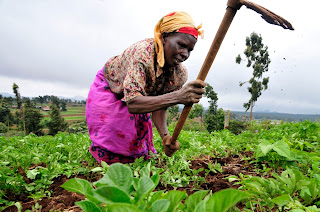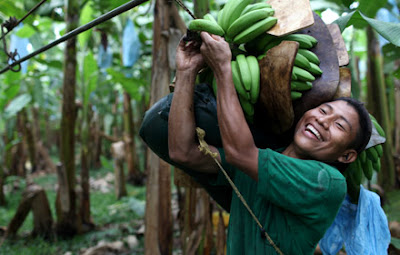The last time you visited your local supermarket, you may have come across this blue and green logo pictured here. In fact it is more than likely, as this image can be found on a massive range of products, from coffee and fruits, beauty products and flowers, to sugar, wines, cosmetics and peanuts. But what exactly does this logo signify? And why does it matter?
About Fair Trade:
Fair Trade is a global organisation that acts to provide an alternative approach for farmers in developing countries, in terms of the conventional free trade that usually occurs between businesses. Free trade is the business policy where trade between businesses occurs without intervention from the government or other outside parties. This means that buyers and sellers are able to trade with one another under there own pre-concieved terms. This is widely considered the most efficient mode of trade today, as it allows businesses to fail or succeed based on their own merits in the free market. However, Fair Trade takes a much different approach to this method, by creating certain trade regulations and conditions for farmers and business owners in poorly developed countries to adhere to.
In certain countries, from Africa, India south america and the middle east, many smaller scale business owners are marginalised and are victims of their countries, due to crime, poverty, and adverse natural environments. This means that these workers (most often farmers) have major barriers when it comes to achieving high enough profits to sustain their business, and therefore eventually fail. This is bad news not only for the business owners trying to make a living, but also their families, the communities they live in, and their towns, cities and nations that require businesses such as this to thrive for the sake of economic stability. However, it is highly beneficial for a struggling business to sell its products as part of Fair Trade, if it is to succeed in the long-term due to the safety net it provides. For example, Fair Trade works to aid small scale businesses that struggle over larger organisations, by providing them with fair prices for the products they sell and good conditions for trade. It also aims to give business owners a vote in the Fair Trade organisation, and provide business owners with a minimum earning price. This means that regardless of the state of the market, these businesses will always gain a profit that can sustain them and their business. Before a business can achieve these benefits however, it must adhere to a large set of regulations. These can include setting certain work condition standards, such as hiring a minimum or maximum number of employees, and getting them to follow particular health and safety protocols in the work place. Other regulations may also include using sustainable farming practices that do not adversely affect the environment or aid in global warming, as well as setting standards that decrease work discrimination. If businesses follow these, and many more regulations set up by the organisation, they have much to gain with Fair Trade.
In certain countries, from Africa, India south america and the middle east, many smaller scale business owners are marginalised and are victims of their countries, due to crime, poverty, and adverse natural environments. This means that these workers (most often farmers) have major barriers when it comes to achieving high enough profits to sustain their business, and therefore eventually fail. This is bad news not only for the business owners trying to make a living, but also their families, the communities they live in, and their towns, cities and nations that require businesses such as this to thrive for the sake of economic stability. However, it is highly beneficial for a struggling business to sell its products as part of Fair Trade, if it is to succeed in the long-term due to the safety net it provides. For example, Fair Trade works to aid small scale businesses that struggle over larger organisations, by providing them with fair prices for the products they sell and good conditions for trade. It also aims to give business owners a vote in the Fair Trade organisation, and provide business owners with a minimum earning price. This means that regardless of the state of the market, these businesses will always gain a profit that can sustain them and their business. Before a business can achieve these benefits however, it must adhere to a large set of regulations. These can include setting certain work condition standards, such as hiring a minimum or maximum number of employees, and getting them to follow particular health and safety protocols in the work place. Other regulations may also include using sustainable farming practices that do not adversely affect the environment or aid in global warming, as well as setting standards that decrease work discrimination. If businesses follow these, and many more regulations set up by the organisation, they have much to gain with Fair Trade.
By urging business owners to follow a large set of regulations, Fair trade provides them with the added support they would not have when going it alone. This gives them a better chance of making a profit, feeding their families, and benefiting their struggling communities. Evidence of this can be seen in the banana trade. Bananas are probably the most famous product to carry the fair trade symbol, however the industry of banana farming suffers a great deal of social turmoil. Due to precarious employment, crime, and poor health regulations for workers in areas such as Ecuador and costa rica, it is difficult for small businesses to succeed. However through the fair trade system, many communities in these areas are given a chance due to improved regulations, employment, and better pay, to provide bananas to millions around the world, and earn a decent and sustainable profit while doing so.
This simple Fair Trade logo sticker found on a huge range of products is a sign that these products are sold by small scale businesses, many of which are situated in third world countries, and are being given a helping hand by the Fair Trade organisation. So the next time you visit your local supermarket, and see the iconic logo on a piece of fruit, a packet of peanuts, or a bag of cosmetic products, remember the incredible organisation behind it, and the vital works the logo signifies.
-Thomas Glen
This simple Fair Trade logo sticker found on a huge range of products is a sign that these products are sold by small scale businesses, many of which are situated in third world countries, and are being given a helping hand by the Fair Trade organisation. So the next time you visit your local supermarket, and see the iconic logo on a piece of fruit, a packet of peanuts, or a bag of cosmetic products, remember the incredible organisation behind it, and the vital works the logo signifies.
-Thomas Glen
Facebook.com/goodnaturepage



